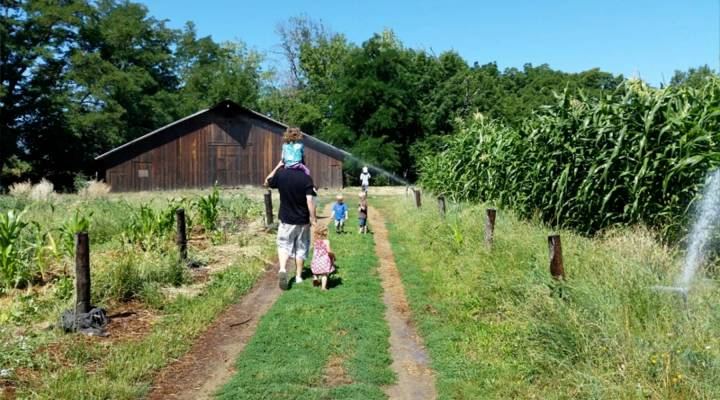
Farming program aims to help addicts and their families

In southern Oregon, the city of Medford has a high concentration substance abuse. It’s even earned the nickname “Methford.” One of the problems that comes with drug addiction is child abuse and neglect. But the local Family Nurturing Center wants to prevent that, so it started the Farm & Food Program.
Located at the Historic Hanley Farm, outside of Medford, the program brings together families that are vulnerable to addiction, child neglect, and food insecurity. In the fields, moms and dads learn to grow, prepare, and preserve healthy food.
“I’m learning a bunch about organic gardening and I love just being outside in the sunshine and doing hard manual work,” said Mary Strock, as she turns the crank of a corn sheller. Later, the kernels will be milled and baked into corn bread. This is one of the central activities at the Farm & Food Program, because families can participate in the full cycle of the heirloom corn, from harvesting to eating. “It feels goods on my body, on my soul and my spirit,” she said.
As a mother of three, Strock struggled with heroin addiction. Last year, she was enrolled in a residential treatment program, called OnTrack, in Medford. For five years now, dads and moms, like Mary Strock, have been coming to the Farm & Food Program. On a weekly basis they volunteer in the gardens, learn about nutritious food, and gain parenting skills. Strock is now employed as a peer mentor to support the other mothers in the program.
“That’s a huge part of recovery is learning how to give back and get out of the self centered-ness, and it feels really good when you start to find ways to do that,” Strock said.

Moms and dads help plant corn as part of the Farm & Food Program in southern Oregon
Doug Lofdahl, who works at the Family Nurturing Center, created the program to give people with addiction access to activities and resources that weren’t available to them. “We try to frame this program so that it’s not about treating people with a diagnosis, but we’re thinking of those diagnoses as symptoms of things that are lacking in our community,” He said.
One of the things that can be lacking is food. According to a 2014 report from the U.S. Department of Agriculture, Oregon is among states with high rates of food insecurity.
“So a primary goal is to increase family’s access to enough food that provides adequate nutrition,” said Kristin Galabrun, who co-manages the program with Lofdahl.
And nutrition is crucial for child development, said Philip Yates of ACCESS, a non-profit that provides food and housing to low income families.
“So I think programs that the Family Nurturing Center are offering really help address those issues early on and give the families a sense of stability and knowledge of what kinds of things are important for them to eat that will make them healthy, and their kids as well,” Yates said.
With healthy diet comes improved emotional well being, which, said Galabrun, “affects our relationship with ourselves, with our kids, with our families, with our communities and with our environment.”
Rocky Wales says he has been a heroin addict for years. He’s was enrolled in OnTrack’s Dad’s Program this summer, which meets once a week on the farm for 3 hours of volunteer work. His wife was in the Mom’s Program. During weekly Family Groups on the farm, parents get to reunite with their kids, cook meals from the food they harvest, and support each others’ families.
“It’s just an atmosphere where everybody wants to get clean,” said Wales. “They want to live a better life, they want to be there for their children and just break that cycle, basically.”
In the fields, the garden beds boast seasonal vegetables such as corn, greens, cabbage, squash, and tomatoes. The idea is to maintain a simple, no-till grow space – something families can create at home.
Wales and his wife are now in outpatient treatment. They live together in a house with their two kids. “It just keeps you away from scene and the chaos of everyday life where people go back and relapse. If you ever get to that point, you’ve got to stay connected,” he said.
After they graduate from OnTrack, parents like Wales are still encouraged to keep volunteering on the farm.
There’s a lot happening in the world. Through it all, Marketplace is here for you.
You rely on Marketplace to break down the world’s events and tell you how it affects you in a fact-based, approachable way. We rely on your financial support to keep making that possible.
Your donation today powers the independent journalism that you rely on. For just $5/month, you can help sustain Marketplace so we can keep reporting on the things that matter to you.












